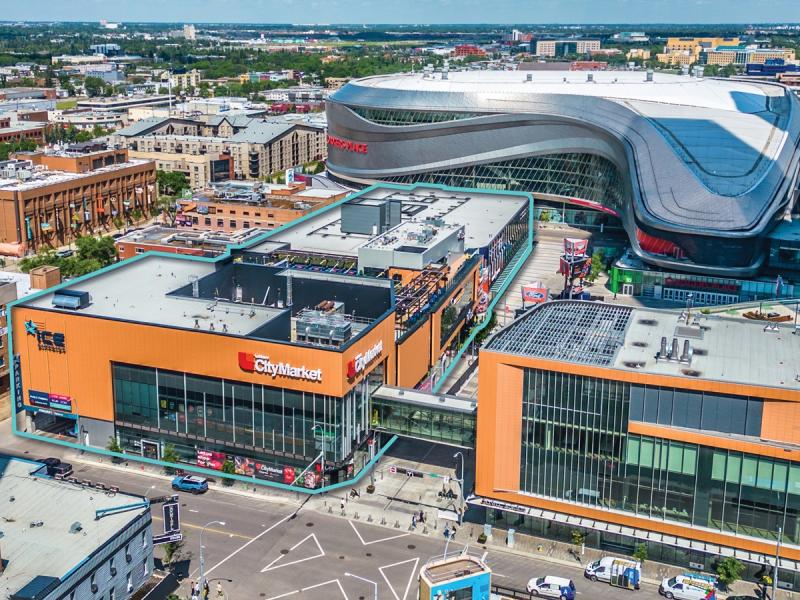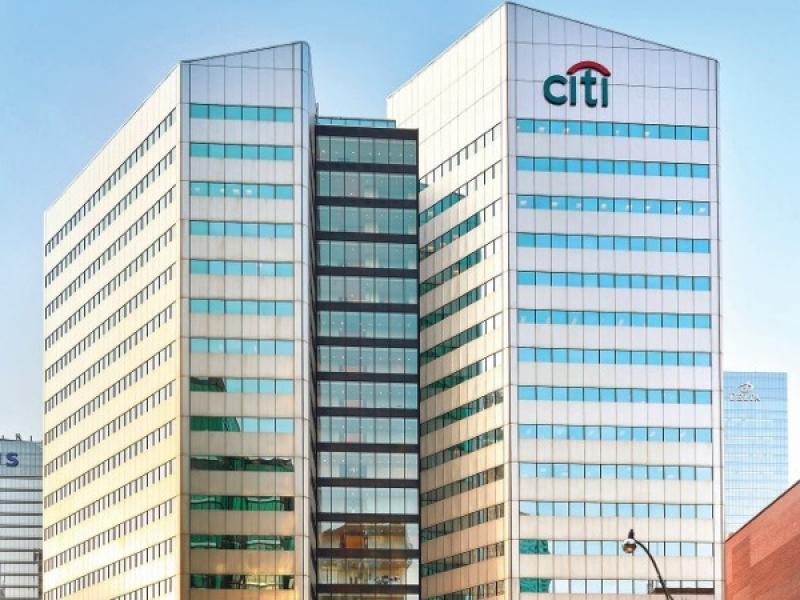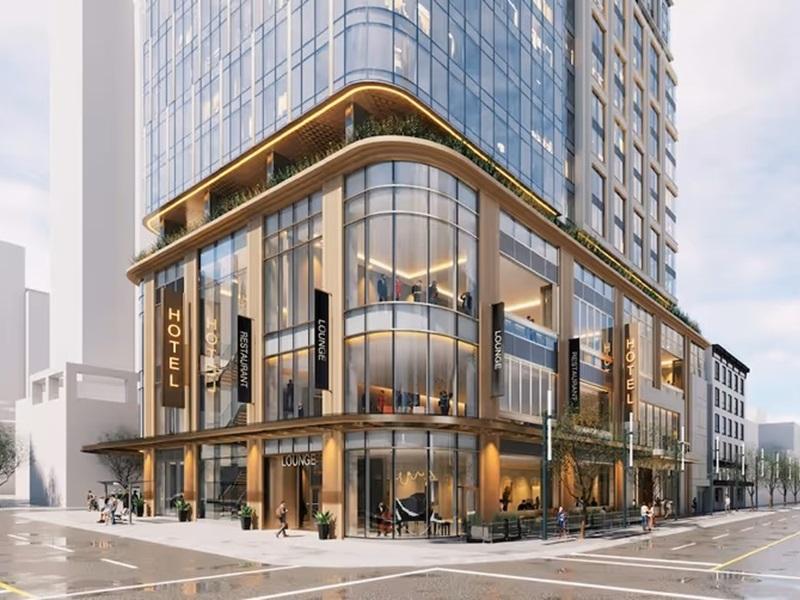
Members of the closing roundtable discuss commercial real estate fundamentals at Real Capital 2019 in Toronto. (Steve McLean RENX)
Commercial real estate fundamentals are generally strong in North America and Europe, which bodes well for another solid year for investors, according to a panel of five top executives who closed the Feb. 26 Real Capital conference.
Toronto and Vancouver are very strong in most asset classes, with Montreal nipping at their heels, while the Alberta office market is going down and the rest of Canada is relatively flat, according to Paul Zemla, Bentall Kennedy’s president of investment management and chief investment officer.
“It’s unusual that you have such a divergence of performance across one country, but that’s what we’ve had for the past few years,” he told an audience of industry players at the Metro Toronto Convention Centre.
Zemla said Toronto-based Bentall Kennedy, which is merging with multi-national real estate investment management and advisory firm GreenOak Real Estate to increase its global presence, has built an office, industrial and multi-family development pipeline over the past few years. He believes that’s where the company’s biggest returns will be generated.
Toronto-based Crestpoint Real Estate Investments president Kevin Leon said Canada’s CRE market has experienced “a perfect storm” in recent years, buoyed by steady growth, low interest rates, market transparency, the depressed value of the dollar, and good education and health systems.
“Net absorption has been really strong in Canada for the last two or three years, and at some point that’s going to change and become a little softer,” said Leon. “But, at least for the foreseeable future, the fundamentals are going to remain strong because supply is two or three years out.”
Leon said Crestpoint has a lot of infill industrial land it’s looking to build on, and it wants to partner with developers with redevelopment expertise to help mitigate risk.
Granite REIT is focusing on logistics
Toronto-based Granite REIT (GRT-UN-T) specializes in industrial, warehouse and logistics properties in North America and seven European countries.
President and chief executive officer Kevan Gorrie said vacancy rates are in the three to four per cent range in Western Europe, rents haven’t surpassed 2008 levels in many markets, and e-commerce penetration is in the early stages compared to the United States. He’s convinced that fundamentals in Granite’s preferred asset class will remain strong for the foreseeable future.
“We want to be more relevant and active in Canada and think there are opportunities based on the growth prospects of the markets and the fundamentals,” said Gorrie. “We also want to be active in the U.S. for slightly different reasons, and in Europe as well. In terms of e-commerce and logistics, Europe is a sleeping giant.”
Granite’s biggest rent growth occurred in Toronto and Vancouver last year, while Indianapolis, Louisville, Cincinnati, Memphis and Columbus are performing beyond expectations as logistics hubs in the United States. Gorrie said the widening of the Panama Canal is having a positive impact on logistics assets in Savannah, Miami, Houston and Charleston.
Granite is looking for targeted development opportunities in core markets, which Gorrie thinks will generate the best long-term returns for investors, as well as redevelopment opportunities within its existing portfolio.
Brookfield and Dream Global REIT
Brookfield Asset Management (BAM-A-T) has investments around the world. Real estate managing partner David Arthur said it’s buying assets in Brazil and India for well below replacement cost, has paused its activity in London due to Brexit uncertainty, and is focusing on development in North America, where it’s difficult to buy properties for below replacement cost.
Brookfield is also a seller of industrial properties and a buyer of retail properties in the U.S., according to Arthur.
“We see retail as a contrarian play. It’s not a favoured asset class and we’ve doubled down on retail in the last number of months.”
Toronto-based Dream Global REIT (DRG-UN-T) is invested in northwestern Europe, where fundamentals are very good despite nervousness due to a perception that things are struggling.
The trust started investing in Germany in 2011, and now has 70 per cent of its investments there. Its portfolio also includes properties in the Netherlands, Belgium and Austria. President and CEO Jane Gavan said Dream wrote up its asset value by 25 per cent last year.
Gavan said the cost of debt outside of Canada is attractive, and there are plenty of options to spend money in Europe.
“There are probably 25 markets we could invest in in Germany, and probably eight markets we could invest in in the Netherlands. The depth of the pool is so much bigger and the depth of capital is so much bigger. For us, it represents the path that Canadian pension funds took in diversification in bigger markets with bigger opportunities. Canada is terrific, but it was really good for us to go outside of Canada.”
Gavan said most of Dream’s European acquisitions are in the $50-million to $100-million range. It spent approximately $1.4 billion there in 2017 and added another $400 million in purchases last year. The REIT’s focus is now turning more to value-add acquisitions and redeveloping existing properties.
While Brookfield is headquartered in Toronto, less than 10 per cent of its real estate assets are in Canada. It’s active in different sectors around the world.
“It gives us an opportunity to balance out different opportunities and factors that are at play in different countries and sectors by being diversified,” said Arthur. “There are different points where it’s a good time to buy or a good time to sell.”
Foreign investment in Canada
While there’s interest in an increasing range of Canadian commercial real estate sectors from international investors, Zemla believes the market is somewhat underrated because capitalization rates are often seen as being too high.
“Many global investors consider Canada to be quite expensive and think that there may be more growth elsewhere, so they continue to chase deals in other markets,” he said.
Chinese investors have been involved in some large acquisitions, particularly in Vancouver, during the past decade. However, those same purchasers have more recently been in sell mode. Leon said Asian investors he’s spoken with lately are only looking at six- or seven-year holds for acquisitions.
“Long-term capital is rare,” he stated. “I think it may grow a little bit, but generally speaking Canada isn’t on the radar screens for most foreign capital.”
Crestpoint has an aggregation of investments from small and medium-sized pension plans investing in global real estate. However, its overall real estate allocations are usually below 10 per cent, versus larger pension plans that have 15 to 20 per cent of their investments allocated to real estate.







